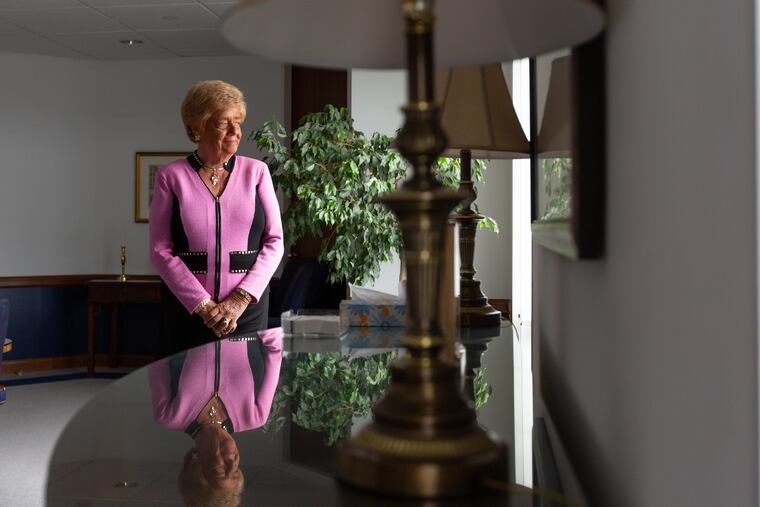Philly-based Diversified Search increases revenues by the millions, and plans to keep expanding
Many top executive search firms have placed diversity at the forefront of their searches. And Diversified Search, founded and chaired by a woman, just bought a company that is 90% women and has an average employee age of 35.

When Judith von Seldeneck moved to Philadelphia in 1974, she had a vision to revolutionize the job search and hiring process for women.
Von Seldeneck recalls using shoe boxes to store hundreds of color-coded note cards with candidate hiring information in her quest to find full-time, well-paying jobs for women. The High Point, N.C., native said Diversified Search’s first hiring fee totaled about $1,300, which the candidate could repay over three years without interest.
Today, it’s a different story. The 150-person company she founded now has offices in 30 countries and 60 cities. It lands $1 million in hiring fees for placing C-suite executives, like CEOs, CFOs, and COOs, at organizations such as Amazon, Lockheed Martin, and Yale University. And in the last three months, it has acquired two more search companies, expanding its specialties and growing its annual revenue by 40%.
The company acquired Grant Cooper, a St. Louis health-care search firm, in July and Koya Leadership Partners, a Boston-based search firm focused in nonprofit and higher education, in June. With these additions, Diversified Search will likely become the nation’s fifth-largest search firm based on size and revenue, said von Seldeneck, up from its current ranking as seventh, according to Forbes’ list of America’s top executive search firms. It is the largest female-founded firm and completed 723 executive searches in 2018, a 35% increase over 2016.
“We are growing exponentially, and we have no intention of slowing down,” von Seldeneck said her executive suite on the 33rd floor of One Commerce Square overlooking the Schuylkill. The company expects revenue to hit $90 million this year.
The recent acquisitions may be a challenge, because health-care firms tend to be more focused on the bottom line while those with more millennial employees value healthy workplace culture, strong company missions, and diverse employee representation. Diversified Search prides itself on candidate diversity, which has been central to its mission since its founding. The company said that 61% of its placed candidates were women or people of diverse background from 2014 to 2018.
In the last decade, many top executive search firms have placed diversity at the forefront of their searches. “Every exec search firm must be able to demonstrate that they value diversity within their organization and the candidate pools that we introduce to our clients,” said Cynthia Soledad, Chicago-based co-lead of the diversity and inclusion practice for Egon Zehnder, one of the world’s largest executive search firms.
Soledad said that firms that cannot show that they value diversity will be at a major disadvantage, as this influences the future leaders of the country’s largest companies. “We feel like [executive search firms] are arbiters of what great leadership looks like in the future.”
Grant Cooper fits the mold of Diversified Search’s main client base, as von Seldeneck said, since health care has been the company’s largest and strongest sector. On the other hand, Koya Leadership Partners, a company that is 90% women and has an average employee age of 35, specializes in higher education and nonprofits, sectors that are mission-driven and oriented around social justice.
“Integrating these cultures in the work that we do is really powerful,” von Seldeneck said. “Both are extremes, but bringing together this new model could really improve our client and candidate experience.”
The candidate search process can take months to complete. Once a company hires a firm to fill a position, the firm intensely interviews its employees and board members to write a position description and understand ideal candidate qualities in a professional and personal sense.
“We have to know everything about that industry and what’s affecting it,” said Leslie Pickus Mazza, senior vice president of quality and talent at Diversified Search.
From there, researchers and recruiters begin searching for ideal candidates through its database filled with thousands of employees’ information. Once it makes a slate of top tier candidates, it will build a report detailing their qualifications for the company. Von Seldeneck said they must find out everything about a candidate — running background and credit checks, and making sure there would be no surprises for the company. The firm also coordinates interviews, negotiates pay in an economy where candidates expect a significant increase (about 20%), and ultimately aids with the onboarding process.
The entire process is confidential, since nearly all the people Diversified recruits are not looking for a job, Mazza said. They use high-tech, password-protected portals and even make their interns sign nondisclosure agreements to make sure current jobs are not at risk.
Over the last 20 years, changes in technology, family dynamics, and workplace culture have transformed this process. As of 2016, 61% of American families have two working parents, according to the Bureau of Labor Statistics, which makes it harder to pull candidates away from their current job and uproot their partner and family.
And, as the country’s unemployment rate reaches record lows at about 3.8%, it becomes even more difficult to find quality candidates willing to make the jump.
“The kind of people that we are searching for these positions … are often not looking to change jobs. They’re doing well on a fast track to becoming top executives," said von Seldeneck.